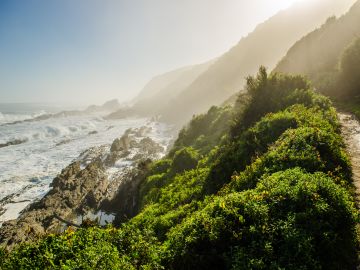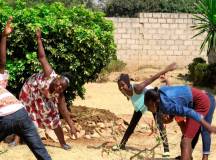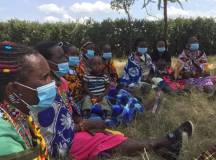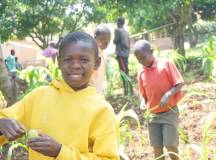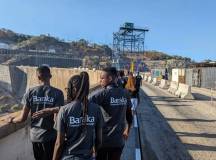Jinja Uganda, is Uganda’s second largest city; on the one hand it is a prosperous economic hub; on the other, you only have to scratch beneath the surface to see the deep poverty that children on the streets live in. Life on the streets is one of extreme hardship, with constant danger of physical, emotional, and sexual abuse.
We have partnered with S.A.L.V.E. International, an NGO out on the ground who are offering young people on the streets a safe place to stay, whilst supporting them to resettle back into a loving home. At the Halfway Home where the children stay, Exodus Adventure Travels Foundation is funding the ‘Growing for the Future’ programme which provides training in sustainable agriculture techniques.
Lessons cover a wide variety of aspects of permaculture farming such composting, water conservation, soil quality, animal husbandry and how to grow nutritious food at home even within small spaces and slum areas by using sack or container gardening. All of these practices help families increase their food production and combat the impact of climate change. Children who have been on the ‘Growing for the Future programme’ are given a start-up package of seeds and tools once resettled to their families to help them to keep using their skills and become more self-sufficient. These lessons are shared with their families and their communities, with an emphasis on building up the young people’s self-confidence during the training so that they believe in themselves enough to share their skills.
In Kenya’s Mara region, the closure of the tourism industry throughout the global pandemic has left masses of people unemployed. With diminished income and increased uncertainty, women and children have found themselves on the receiving end of emotional challenges as well as socio-economic challenges arising from these difficulties, including an increase in intimate partner violence and cases of child abuse.
Through our Community Kickstart Project, and their engagement with Masai communities, our local operator was able to plan and run a Masai Women’s Empowerment workshop. This focused on building financial, social, and emotional resilience, and equipping women with parenting skills in hardship situations. Throughout the workshop, participants were equipped with the skills they need to manage their stress and emotional well-being, how to respond to and report gender-based violence, and how to better communicate difficult or sensitive news to their children. The women also joined training sessions on soap making and knitting, to help them explore new ideas for income generation to help supplement their household budgets. By the end of the workshop, the participants had all the skills they needed to help build a network for personal and community empowerment in the wake of the pandemic.
“Tourism is our major source of income here and when the pandemic hit, it affected us badly. From the monthly land leases and fees that we get from the conservancy to our beading business – we couldn’t sell anything as there weren’t any tourists. I learnt many things [at the workshop] that were different from the usual common beadwork we do in Maasai. In fact, I’ve learnt a new skill which has now become an alternative source of income for me. I’ve made it into a small business, which has helped to improve my family’s financial situation.” Naomi Nasha, Workshop Participant, Kenya.
To read more of Naomi Nasha’s story, take a look at our International Women’s Day 2022 blog, here.
